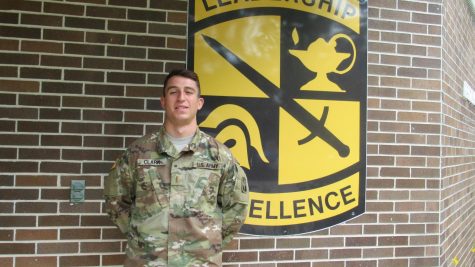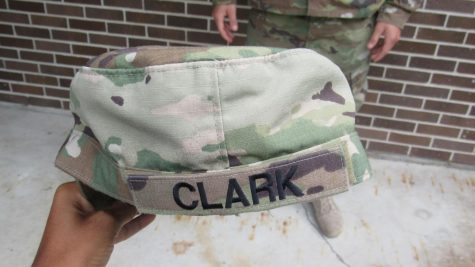
While some students are still looking to find their path, the cadets of the UNF Army ROTC have accepted their calling.
Tucked away between the Green and the Fine Art building is the Army ROTC office.
The program came back alive in January 2009 under LTC Benjamin Jones. Eight year later, the program has continued to grow with cadets and the commissioned officers of the reserves, National Guard or Active Duty.
John Clark, a spring 2017 graduate, was commissioned as a second lieutenant at the April 28 graduation. A second lieutenant is the first rank one can receive as an officer.
“Since I was a kid I knew that I wanted to be in the military. I looked into the Navy, I looked into the Air Force a little bit and just being accepted here into UNF,” Clark said. “This is where I wanted to go and it was convenient for me since the Army ROTC program was here. And I wanted to do something a little different than my dad.”
Clark spent all four years in the program, gaining more and more responsibilities and skills.
“Commissioning experience was awesome. Something I’ve been looking forward to for my four years here,” Clark said.
During his commission, his father, who is retired Air Force, pinned him and created a memory Clark will always have. Afterward, the commissioned officers received a standing ovation from the crowd.
Commissions of officers usually occurs in the spring or summer but there have been cases of services in the fall. This all depends on the degree plan of the students. Clark leaves for Basic Officer Leader Course in October.
“I think ROTC held me more accountable because I had more motivation to do well in my classes,” Clark said. “I was being held to a higher standard.”
Clark described the process as difficult at the beginning, but over time it became easier as he balanced his time.

Capt. Dan Palmer, assistant professor of military science, described how the physical aspects entwine with the academic expectations.
“Three times a week we meet for physical training in the morning and then once during the week on Thursdays afternoon we meet for lab,” Palmer said. “Which essentially where we take everything we learned Tuesdays and Thursdays of the week in the academic setting and apply it to land navigation in the field or practicing some type of squad tact.”
Throughout the four years, leadership is a major component of the program. Each year, the cadet receive more responsibility and eventually be in charge of their own unit as a senior.
“Their senior year, they are really in charge of the training overall,” Palmer said. “Trying to make it a very cadet-driven program as we guide them along.”
Cadets go to camp twice in the summer, once as a sophomore and again as a senior. There, they learn the basics of the Army such as shooting before being evaluated on what they learned as a senior.
“Academics plays probably the largest role in their overall ranking, that’s definitely a focus to make sure they succeed in the Army and here at school as well,” Palmer said.
While the program is still considered small, the quality of cadets that are commissioned is high. A goal of the program is to continue to grow while producing high-quality cadets that can be commissioned.
Sergeant First Class Richard Cleverdon, senior military instructor, said the program started this semester with 32 cadets but after the recruitment run, they had 49.
During the spring 2017 semester, four cadets were recognized as part of the top ten in the state of Florida.
The following cadets were commissioned in spring:
Marques Adams
John Stephen Clark III
Aaron Costello
Aaron Eckstrand
Abby Hammock
Seth Travis Harbin
Colten Juliana
Perry Thomas
Stuart Touchton
Robin Clark
__
For more information or news tips, or if you see an error in this story or have any compliments or concerns, contact editor@unfspinnaker.com.







